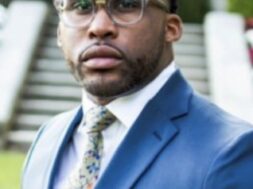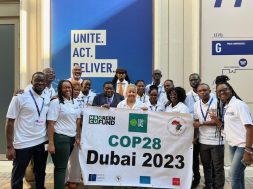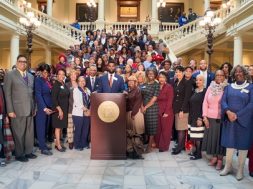
President Obama Applauds New Commitments in Support of the My Brother’s Keeper Initiative
 In February, as part of his plan to make 2014 a year of action focused on expanding opportunity for all Americans, the President unveiled the “My Brother’s Keeper” initiative to address persistent opportunity gaps faced by boys and young men of color and ensure that all young people can reach their full potential. As part of the initiative’s launch, the President also established the My Brother’s Keeper Task Force to review public and private sector programs, policies, and strategies and determine ways the Federal Government can better support these efforts, and how to better involve State and local officials, the private sector, and the philanthropic community.
In February, as part of his plan to make 2014 a year of action focused on expanding opportunity for all Americans, the President unveiled the “My Brother’s Keeper” initiative to address persistent opportunity gaps faced by boys and young men of color and ensure that all young people can reach their full potential. As part of the initiative’s launch, the President also established the My Brother’s Keeper Task Force to review public and private sector programs, policies, and strategies and determine ways the Federal Government can better support these efforts, and how to better involve State and local officials, the private sector, and the philanthropic community.
Today, the President announced new commitments in support of the My Brother’s Keeper initiative at the in Washington, DC. Following the announcement, the President will hold a town hall session where he will take questions from the group of DC-area youth who will attend the event. During the session, the President will highlight how the My Brother’s Keeper initiative and the Administration continue to work to build ladders of opportunity for all young people across the country. In attendance at the event will be leaders from 60-plus school districts across the country with the Council of the Great City Schools, parents, business leaders, athletes, mayors and members of Congress.
Today, Magic Johnson Enterprises’ Earvin “Magic” Johnson and Deloitte CEO Joe Echevarria launched the National Convening Council (“NCC”), an independent private sector initiative bringing together leaders from business, philanthropy and the faith, youth and nonprofit communities. Over the next several months, the NCC will travel the country, lifting up examples of cross-sector efforts that are having a positive impact on boys and young men of color.
Creating Opportunity for All
For decades, opportunity has lagged for boys and young men of color. But across the country, communities are adopting approaches to help put these boys and young men on the path to success. And the President, joined by foundations, businesses, and many other leaders, wants to build on that success to ensure that all young people, including boys and young men of color, who are willing to work hard have an opportunity to get ahead and reach their full potential.
The My Brother’s Keeper initiative encourages the use of proven tools that expand opportunity for young people, including access to basic health, nutrition, mentorship, high-quality early education and early introductions into the workforce, as well as partnering with communities and police to reduce violence and make our classrooms and streets safer.
On May 30th, the My Brother’s Keeper Task Force released its 90-day report. This report includes key indicators that will provide a comprehensive view of the environments and outcomes for boys and young men of color and their peers. It also contains recommendations on steps our society can take to begin to expand opportunity for all in areas including:
o Entering school ready to learn;
o Reading at grade level by third grade;
o Graduating from high school ready for college and career;
o Completing post-secondary education or training;
o Entering the workforce; and
o Reducing violence and providing a second chance.
The Administration is doing its part by identifying programs and policies that work, and recommending action that will help all our young people succeed. Since the launch of My Brother’s Keeper, the President’s Task Force has met with and heard from thousands of Americans, through online and in-person listening sessions, who are already taking action.
New Commitments
Today, leading private sector organizations announced independent commitments that further the goals of the My Brother’s Keeper initiative and directly address some of the key recommendations in the Task Force Report.
Reducing High School Dropout Rates, Improving the Worst Performing Schools and Actively Recruiting High Quality and Sustained Mentors:
· The NBA, the National Basketball Players Association (NBPA) and the National Basketball Retired Players Association (NBRPA) announced a five-year commitment in partnership with MENTOR: The National Mentoring Partnership, Team Turnaround and the Council of the Great City Schools (CGCS).
o Through the partnership, these organizations will support a public service announcement campaign designed to recruit 25,000 new mentors, with a specific emphasis on recruiting men of color.
o The NBA and its teams will work with educators in at-risk schools across many of their franchise cities to provide incentive programs that increase attendance and improve overall school performance. Current and former NBA players will also participate in a series of grassroots, “lessons in leadership and teamwork” workshops in schools and after-school organizations that will inspire boys and young men of color to take charge of their lives, make good decisions, and be successful in their pursuit of education.
· AT&T announced an $18 million commitment this year to support mentoring and other education programs with a mentoring component as part of the company’s Aspire initiative – a $350 million commitment focused on high school success and workforce readiness for students at risk of dropping out of school.
o AT&T is launching the Aspire Mentoring Academy Corps, powered by AmeriCorps, AT&T and MENTOR: The National Mentoring Partnership to support AmeriCorps members in regions around the country and engage thousands of at-risk youth in mentoring activities.
o AT&T will expand the engagement of its employees through the Aspire Mentoring Academy with a goal to provide students who are at risk of dropping out of high school with 1 million hours of mentoring by the end of 2016.
o AT&T is using technology to scale its efforts through online mentoring, developing a mentoring app and piloting a program that mentors students through the CISCO IT certification process, thus developing critical Science, Technology, Engineering and Mathematics (STEM) skills.
Creating High Schools for the New Economy
· With a commitment of $50 million, the Emerson Collective, founded by Laurene Powell Jobs, along with partners from Silicon Valley and elsewhere, will collaborate with districts and educators to launch a competition to find and develop the best designs for next generation high schools.
o Efforts will include connecting some of Silicon Valley’s best innovators and design thinkers with some of the country’s most effective and inventive educators and students to create schools for the new economy and provide models that can be adopted by other schools in the future.
o This school redesign initiative aims to use the best in design thinking, education research and practice and technology to create new school environments to dramatically increase the engagement and success of currently underserved students enabling them to achieve and compete at the highest levels and provide the supports, tools and resources educators need to be and feel engaged, effective and supported.
Encouraging and Supporting Comprehensive Cradle-to-College-and-Career Community Solutions for Youth:
· Today, the leaders of 60 of the largest school systems in the country, which collectively educate nearly three million of America’s male students of color, have joined in an unprecedented pledge to change life outcomes of boys and young men of color by better serving these students at every stage of their education.
o Through an eleven-point plan that stretches from early childhood to graduation, these school districts will better support boys and young men of color by focusing on strategies with proven results. These include expanding access to high quality preschool, implementing or scaling early warning systems to prevent grade retention, establishing programs to reduce suspensions and expulsions, increasing access to advanced and rigorous coursework and ensuring increased FAFSA completion.
Expanding Access to Advanced Placement (AP) Courses and Rigorous College Prep:
· The College Board is investing over $1.5 million for “All In”, a national College Board program to ensure that 100% of African American, Latino, and Native American students with strong AP potential enroll in at least one matched AP class before graduation.
o As part of their “All In” commitment, the College Board is partnering with all 60 school superintendents who have signed on to the CGCS pledge to identify and reach out to young men of color who have demonstrated the potential to succeed in AP classes.
Creating Entry-Level Job, Mentorship and Apprenticeship Opportunities for Youth:
· Citi Foundation is making a three year, $10 million commitment to create ServiceWorks, a groundbreaking, national program that uses volunteer services to help 25,000 young people in ten cities across the United States develop the skills they need to prepare for college and careers.
o The program, which will deploy 225 AmeriCorps members over three years, will engage youth, age 16-24, in service and build a large-scale volunteer response to the crisis of low college and career attainment. The young people – in Boston, Chicago, Dallas, Los Angeles, Miami, New York, Newark, San Francisco, St. Louis and Washington, D.C. – will receive training in critical 21st century leadership and workplace skills, the chance to build their networks and connections to their communities, and the opportunity to use their new skills by participating in and leading volunteer service projects.
o Thousands of professionals – including Citi employees – will participate as volunteer mentors and trainers.
Disproving the Negative Narrative:
· Discovery Communications will invest more than $1 million to create an original independent special programming event to educate the public about issues related to boys and men of color and address negative public perceptions of them.
o The program will show specific youth stories and the interventions that made a difference in their lives as an illustration of ways to impact the future of boys and men of color. This 1-hour program will air across Discovery networks and is scheduled to air in 2015.
o Discovery Education will also host a series of screenings and town halls in partnership with community based non-profits to discuss “My Brother’s Keeper” stories of intervention and ways that communities can get involved and help address this important issue facing our Nation.
Building on Successful Evidence Based Programs that Recruit High Quality and Sustained Mentors:
· Becoming A Man (B.A.M.) and Match tutoring programs announced $10 million in new funding.
o The funding will support the expansion of B.A.M. and Match tutoring programs, in addition to supporting a large-scale study on the programs’ long-term effects conducted by the University of Chicago Crime Lab and Urban Education Lab. B.A.M. is a mentoring and cognitive behavioral therapy program developed by the nonprofit organization Youth Guidance. Match is an intensive, individualized math tutoring intervention developed by Match Education.
o The commitment is made possible by the Eunice Kennedy Shriver National Institute of Child Health and Human Development of the National Institutes of Health, and Chicago Mayor Rahm Emanuel and the Chicago Public Schools.
o With this announcement, B.A.M. and Match are also committing to expand to 3-5 new cities over the next three years.
MBK Task Force Commitments
Through the MBK Task Force, a federal interagency working group created by Presidential Memorandum, the Departments of Justice (DOJ) and Agriculture (USDA), along with the Corporation for National and Community Service (CNCS) announced today two new youth corps programs to expand opportunities for youth. Both programs directly address recommendations in the Task Force Report. The programs are intended to help young people successfully enter the workforce as well as create additional job opportunities and increase entry-level job, mentorship and apprenticeship options for all young people, including boys and young men of color.
Supporting Disconnected Youth Through Service and Engagement:
· CNCS and the DOJ’s Office of Juvenile Justice and Delinquency Prevention (OJJDP) today announced a jointly funded AmeriCorps program called Youth Opportunity AmeriCorps.
o The program, which totals up to $10 million over three years, will enroll disconnected youth in national service programs as AmeriCorps members over the next 3 years. It includes a mentorship component, in which grantees will provide mentoring support to the AmeriCorps members.
Providing Opportunities that Build Early Career Skills:
· USDA and AmeriCorps today announced a landmark new partnership between AmeriCorps and the USDA’s Forest Service, which connects youth with service opportunities to restore the nation’s forests and grasslands.
o The $3.8 million joint funding will provide resources for both AmeriCorps grantees and member organizations of the 21st Century Conservation Service Corps (21CSC), and will also provide for 300 new AmeriCorps members serving in U.S. Forests.
Previous Private Sector Commitments
· In June 2014, eleven of the nation’s leading philanthropies announced a $194 million investment in initiatives to expand opportunity for boys and young men of color.
· In June 2014, UBS America announced a five-year, $10 million commitment to establish a new education platform for improving college success among under-resourced populations. Commencing in three markets — New York, New Jersey and Connecticut — with an intensive program focused on young men of color, UBS NextGen Leaders aims to empower students with the skills, knowledge and experience needed to succeed in college and compete in the global marketplace.
· In June 2014, JPMorgan Chase & Co. launched the expansion of “The Fellowship Initiative: Expanding the Horizons of Young Men of Color,” to provide boys and young men of color with long-term fellowships and pathways to jobs. The program involves a $10 million commitment to expand the effort to three cities serving nearly 200 youth.







